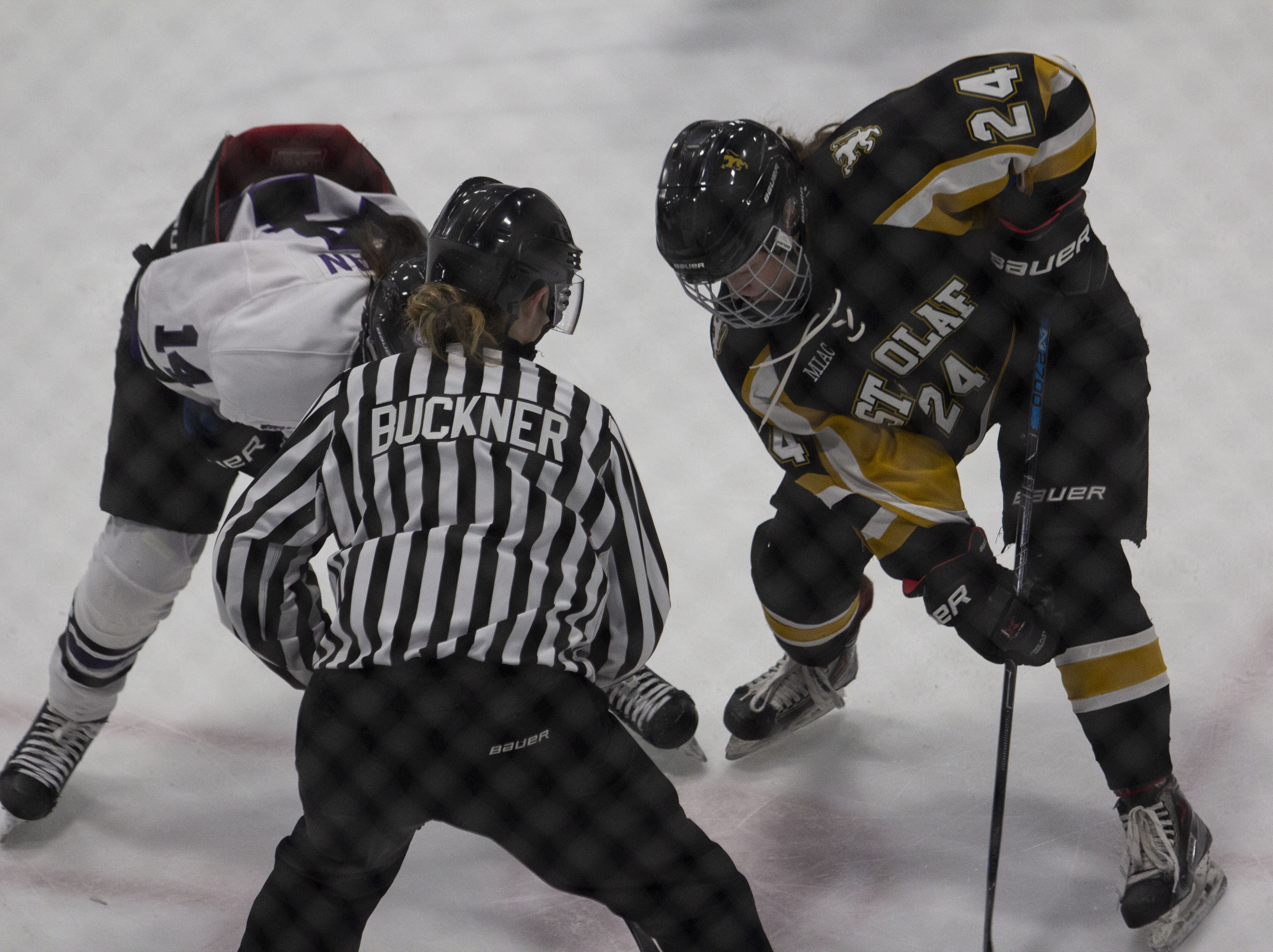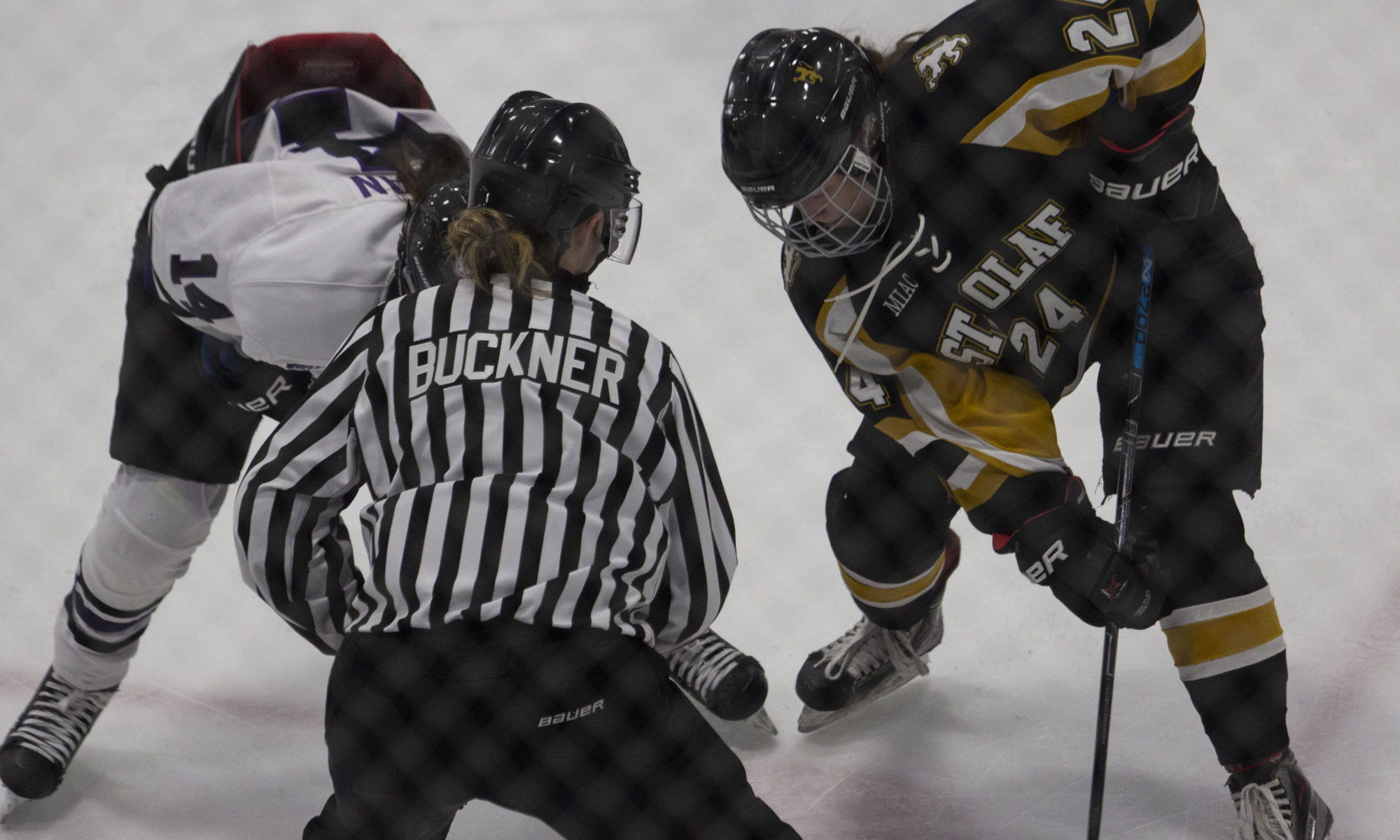
A referee watches as St. Thomas and St. Olaf women’s hockey players face off at a Nov. 15, 2019 game. Minnesota hockey referees and officials, including those who have worked at St. Thomas games, have had to adjust to uncertainty, electronic whistles, and daily health screenings in order to keep games running during the COVID-19 pandemic. (TommieMedia file photo)
Minnesota hockey referees and officials, including those who have worked at St. Thomas games, have had to adjust to uncertainty, electronic whistles, and daily health screenings in order to keep games running during the COVID-19 pandemic.
As the St. Thomas hockey teams met the end of their seasons, filled with delays and cancellations, local sports officials like hockey referee Tony Lancette reflected on their experiences during the pandemic.
“We didn’t know when hockey was going to return, so we were kind of in limbo as far as, ‘When do we start? Do we do training? Do we get prepared for the season? What’s the game going to look like?’” Lancette, who has refereed since 1996, said.
The initial COVID-19 lockdown in March forced some major cancellations for many in the sports world, including 27-year hockey referee Krissy Langley.
“As soon as the quarantine happened and people were notified that they had to stay home, we had state tournaments, the NCAA tournament, all of those events canceled,” Langley said. “You had a lot of heartbreak.”
Aside from staying distant from players, there were other changes to the game. The MIAC replaced whistles that required a referee to physically blow into it with electronic whistles. Langley is fond of the electronic whistle, and purchased one for herself to use at hockey games outside of MIAC.
“I’m one of the rare people that appreciated the electronic whistle. I can put my mask on and never touch it. The second somebody touches their mask or moves it, you’ve now contaminated your hands with whatever liquids are on your mask. I don’t want to touch it, I just want to work with that electronic whistle.” Langley said.
However, Lancette said the instant response of the electronic whistle changes the play of the game.
“Opposed to a regular whistle, where you actually have to bring it up to your mouth and blow the whistle, there’s that little gap in time when you can see, maybe, if the puck is still free or not,” Lancette said. “The other thing is that the electronic whistles are a different sound, and not as loud.”
Assistant editor of The National Organization of Sports Officials and Referees Magazine Luke Modrovsky said Referee Magazine was forced to change its content from game coverage to cancellations.
“We also provided guidance for officials about unemployment. Some sports officials also have full-time jobs, so they might have lost that full-time position,” Modrovsky said.
As the pandemic raged on, Modrovsky said some readers who were sports officials contacted the magazine and shared stories of how their lives had been affected.
“We’ve heard of people going through some of the toughest times of their lives. Not necessarily directly from the virus, but perhaps somebody is unemployed, or maybe they’re suffering from the anxiety of the unknown,” Modrovsky said.
The National Organization of Sports Officials, the non-profit side of Referee Magazine, published a 13-point plan of things for officials to consider before returning to officiating. The plan was also geared toward athletic administrators and officiating coordinators.
Senior Associate Athletic Director for Internal Operations at St. Thomas Cory Chapman praised the Minnesota Intercollegiate Athletic Conference’s guidelines and the initiative that they have taken to ensure the health and safety of officials.
“(The MIAC) implemented a daily health screening for those officials. So, even though there may not be a contest on that given day, the officials are asked to do a health check. Then, once the officials arrive at the venue, the host institution will do a health check upon arrival to their campus,” Chapman said.
Lancette said he feels safe officiating games again because players are being tested. Even though officials get involved in play, he said the risk of COVID-19 transmission is low.
“To be within six feet per fifteen minutes of an (infected) player, it’s probably rare that you’re close to that person unmasked. We have masks on, the players don’t. But for us to get in that close contact group, we’re probably not there,” Lancette said.
However, it’s not impossible for officials to contract the virus at games. Langley says she caught COVID from a game she officiated last fall. After she recovered, Langley went to donate plasma, where they found that she had COVID-19 antibodies.
“For me, knowing that I had antibodies, knowing how my body reacted to COVID, I felt comfortable coming back and skating,” Langley said.
Lancette appreciates the work that officials put into the game.
“The officials that got to work this year got the opportunity to give a little back to the game, and allowed players to play,” Lancette said. “In the wake of this pandemic, it can give them a sense that we’re back to reality because we’re playing hockey.”
Owen Larson can be reached at lars6521@stthomas.edu.

